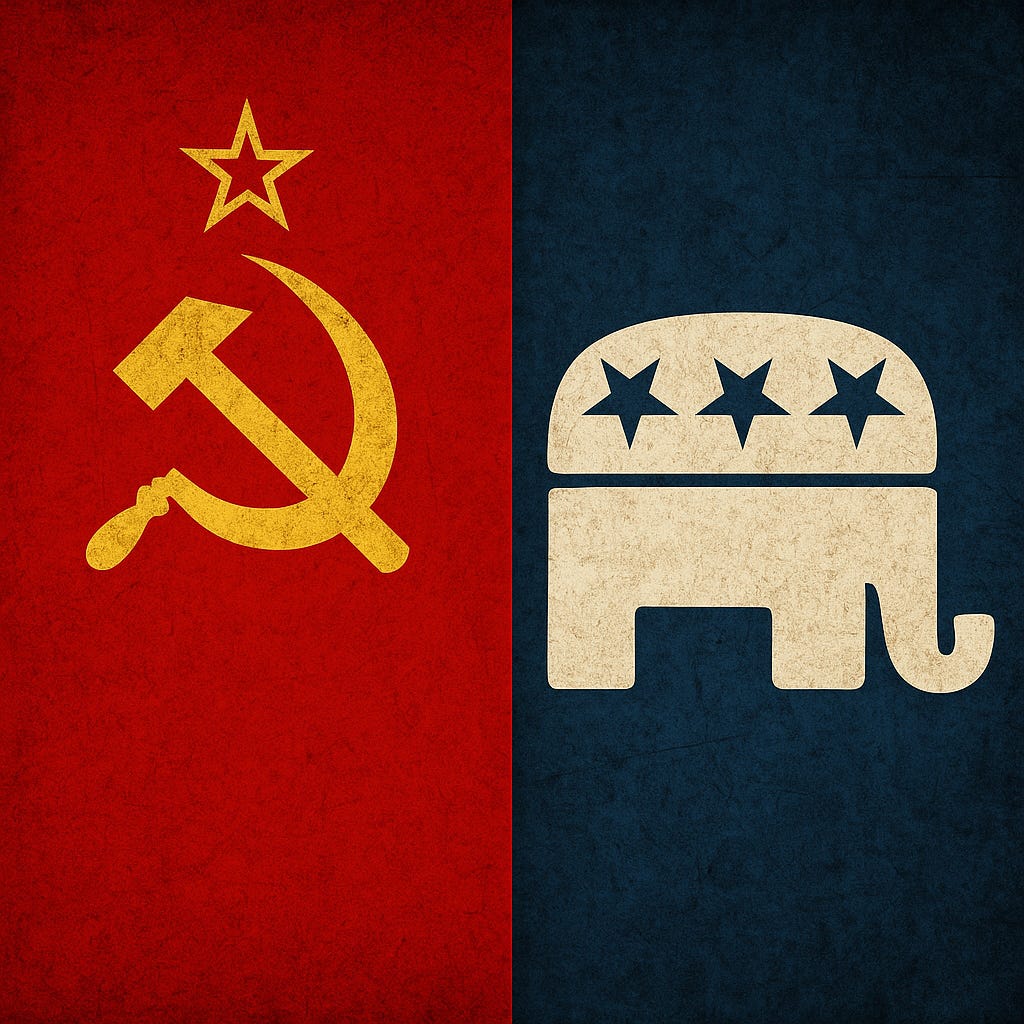✍️ What Republicans Still Fear Most: Shared Prosperity
On Labor Day, a reminder that democracy depends on fairness, not fear
Republicans once defined themselves by fear of authoritarianism. During the postwar decades, the Soviet Union was cast as the ultimate enemy — proof, they said, of what dictatorship looked like.
But what history has revealed is something different. What truly unsettled conservatives wasn’t tyranny abroad. It was economic regulation at home. Authoritarian rulers overseas were tolerated, even welcomed, so long as they defended capitalism. Sharing prosperity among citizens was the red line.
Today, the dynamic has flipped. Democrats and independents are the ones who fear dictatorship. Not from Moscow, but from Washington, D.C., embodied in Trump’s embrace of power without guardrails.
Meanwhile, Republican leaders continue to rail not against authoritarianism but against efforts to share economic power — whether through health care, student debt relief, or climate investment.
This selective outrage — tolerating authoritarianism while resisting economic fairness — has deep roots in conservative politics.
A Convenient Double Standard
This contradiction is not new. During the Cold War, U.S. policy propped up right-wing dictators so long as they opposed communism and supported free-market economics. Remember? Augusto Pinochet in Chile. Apartheid-era South Africa.
At home, conservative politicians embraced McCarthyism, silencing labor organizers, civil rights advocates, and critics of capitalism — not to protect democracy but to preserve economic control.
That pattern persists today. And Trump praises strongmen abroad for their unapologetic grip on power.
A Tale of Two Visions
While both parties contributed to Cold War excesses, it was often Democrats who pushed for a more just society at home.
Programs like the New Deal and Great Society — including Social Security, Medicare, civil rights, and public education — aimed to reduce inequality and expand opportunity. And the labor movement, honored every Labor Day, fought for fair wages, safer workplaces, and collective bargaining.
Conservatives didn’t fear these efforts because they threatened freedom. After all, they tolerated authoritarian regimes abroad. No, it was because they challenged unfettered capitalism.
That contrast has grown starker in recent years. Democrats view economic fairness as essential to democracy. Conservatives often see efforts to regulate capitalism or empower workers as threats to American identity.
Echoes in the Present
The Trump-led GOP has made this contradiction impossible to ignore. Time and again, it tolerates — even celebrates — authoritarian behavior, so long as it protects conservative economic and cultural dominance.
It attacks the press and labels dissent as disloyal. It undermines elections and demonizes federal workers. It praises foreign strongmen like Putin and Orbán — not for their democratic values but for their unapologetic grip on power.
Meanwhile, policies that reduce inequality — debt relief, union protections, expanded health care — are cast not as policy debates but as existential threats to “freedom.” But freedom for whom? From what? And at what cost?
What Do We Mean by Freedom?
It’s time to ask:
What do we really mean when we say we’re defending democracy? And what are conservatives actually trying to defend: freedom or power?
The Cold War wasn’t just a fight against tyranny. For many on the right, it was also a fight against shared prosperity. The threat to their worldview has never been the loss of liberty. It’s been the loss of control.
And their fight against democracy and all U.S. citizens continues today.
A Call to Awareness
The next time someone invokes “freedom” to oppose health care, climate action, or workers’ rights, remember that the labor movement itself was once smeared as “socialist.”
Yet those struggles built the eight-hour day, safer workplaces, and protections we still celebrate on Labor Day. That history is a reminder that demanding fairness isn’t tyranny. It’s how democracy strengthens itself.
And it must benefit everyone — no matter their income, job, faith, race, gender, age, ability, orientation, politics, or hometown.
Authoritarianism doesn’t always come wrapped in a red flag. Sometimes it wears a suit, waves a market index, and calls itself “pro-business.” But if it silences dissent, rigs the system, and strips away rights, it isn’t freedom. It’s tyranny by another name.
Activists must make that clear. And so must conscientious leaders in every field.
Resources for taking action
Executive Overreach & Abuse of Power
A ranked guide to organizations resisting authoritarianism and defending democratic norms.
Worker Power: Labor Rights, Fair Wages & Unions
A ranked guide to advocacy organizations and unions championing workers’ rights, fair pay, safe conditions, and collective power in the workplace.
Public Services & Civil Service Protections
A ranked guide to organizations defending fair, professional public institutions.
Economic Equity & Stability
A ranked guide to advocacy groups promoting economic security, fair wages, and opportunities for working families.
Diversity, Equity & Inclusion
A ranked guide to organizations advancing racial justice, gender equity, and inclusive policies across workplaces, schools, and communities.
Share. If my commentary resonates with you, please share it with friends.
Subscribe. Get new posts from Plainly, Garbl delivered to your inbox.


